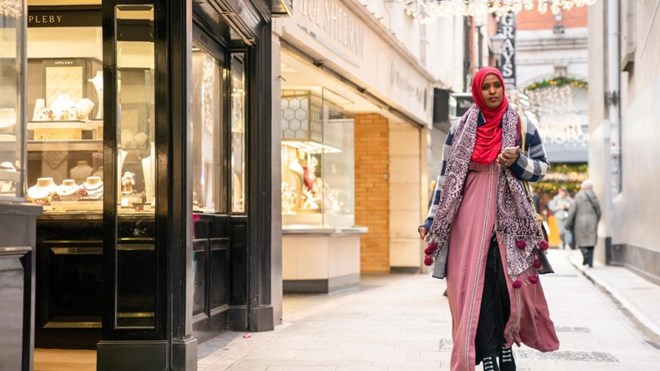
Thursday August 5, 2021
By Aoife Harte in Dublin
Ifrah Ahmed’s fight against FGM has taken on a new urgency during the COVID-19 pandemic.

Ifrah Ahmed, an activist against female genital mutilation born in Somalia, in her new hometown of Dublin, Ireland. © UNHCR/Sean Breithaupt
When Ifrah Ahmed arrived in Ireland as a teenager after fleeing Somalia, it would have been natural if she had focused on building a new life for herself. Instead, she decided to try to save others from a harmful traditional practice that has impacted the lives of millions of women worldwide, including her own - female genital mutilation (FGM).
FGM covers all procedures that involve altering or injuring female genitalia for non-medical reasons. It is recognized internationally as a violation of women and girls’ human rights that can cause short- and long-term health problems.
“I understood that the other young refugees or asylum-seekers did not want to speak out [against FGM], so I took the lead,” said Ifrah. “My vision was to fight against the practice and raise awareness, because in Somalia it was normal.”
Her role as a global campaigner and, since last year, as a High Profile Supporter of UNHCR, the UN Refugee Agency, has only become more important during the COVID-19 pandemic.
The crisis has indeed increased socio-economic pressures in many societies. Women and girls, especially those who are refugees, displaced or stateless, often bear the brunt of those pressures, according to UNHCR.
As a result, there has been a worrying increase in reports of gender-based violence, including FGM.
“It’s a global crisis.”
Two million additional cases of FGM may occur over the next decade as COVID-19 forces schools to close and disrupts programmes that protect girls, according to the UN Children’s Fund.
“COVID has impacted our campaign because in Somalia FGM has increased, especially among the displaced,” said Ifrah. “But it is not only [there] that it has increased, we know that it’s a global crisis.”
More than 200 million women and girls alive today have undergone FGM in 30 countries in Africa, the Middle East and Asia where the practice of FGM is still common. In Somalia, 98 per cent of women and girls have undergone some form of FGM, the highest incidence in the world.
For Ifrah, the fight against FGM is personal.
After fleeing her home in 2006, she reached Ireland where she claimed asylum. A medical check followed, during which doctors discovered she was a victim of FGM.
“The hospital did not really understand what female genital mutilation was. I had to explain… They were asking so many questions like: ‘How did you get injured?’ ‘Who did this to you?’” she said.
Ifrah established The Ifrah Foundation in 2010 to advocate for the eradication of FGM in Somalia. The Foundation’s work has been critical during the COVID-19 pandemic. It has continued to do media training with women in camps for internally displaced people. Part of the training involves producing content for local radio, which is the most effective way of spreading the message about the harms caused by FGM to a wide audience in Somalia.
“It makes me stronger.”
Ifrah remains in constant contact with the Foundation’s young ambassador network which is made up of key influencers throughout Somalia who support the campaign and are trying to bring about change through community empowerment and education.
The Foundation has also facilitated meetings with Somali religious leaders, who have committed to a zero-tolerance approach to FGM, and continues to lobby Somalia’s Parliament to pass legislation that would ban FGM.
At the same time as running the campaign in Somalia, Ifrah is also busy speaking to the media and taking part in international virtual events, as well as caring for her young daughter.
“When I look at her, I feel I will never ever allow anyone to harm her. For me having her - it makes me stronger,” she said.
“If by speaking out I have saved just one girl from being cut then I have succeeded... In the next 10 years I want to see that girls and women are free from genital mutilation, not suffering the consequences that myself and others have had to suffer.”